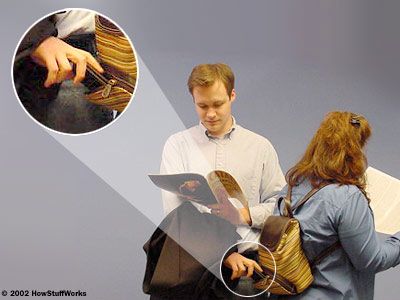If there's money to be had, fraudsters will find a way to try to get it. Investment scams are a very popular form of fraud. A scammer will call you up or send you an e-mail and try to push you into investing in something like an "up-and-coming company with red-hot stock and a product that will change the world." These fraudsters will tell you the investment is risk-free and sure to pay out. And if you don't act now, you'll miss it.
Investment scams also include the infinitely popular Ponzi and pyramid schemes. The idea behind the Ponzi scheme is to pay early investors with the money contributed by later investors. The pyramid scheme, similar in concept, is based on recruitment. You pay the scammer a certain amount of money. When you recruit new investors, they give you money, and you pass some of that money up to the scammer. Your recruits recruit more people, and so on.
Sadly, another common target of scammers is people using Medicare. Telemarketers, junk mail or e-mail scammers will offer you a product or service that will be covered by Medicare. The scammer asks for your Medicare account number and uses your insurance to pay for things you never get or don't need.
Of course, there's old-school fraud, which includes counterfeiting checks, forging signatures, and just plain stealing credit cards, ATM cards, PINs and banking information. Fraudsters will gain direct access to your funds or simply go on spending sprees with your hard-earned bucks. Usually, crooks find this information by digging through your trash or taking statements and bills from your mail. Clever thieves will use cell phone cameras to capture images of your credit card number when you pull it out to pay for your groceries.
Technophile thieves will steal your financial information over the Internet. If you send account information through an unsecured Web site, a vigilant hacker might be able to intercept your credit card number, login or password and gain access to your funds. Sometimes stealing information is as simple as using a public computer and looking for logins and passwords not erased by the previous user.
Another popular scam in the electronic age is phishing. A phishing scheme starts with an e-mail that appears to be from your bank, credit card company or an online merchant you use. The e-mail looks perfectly legitimate -- it even has the company's logo on it. The most ironic phishing e-mail will tell you there has been an unauthorized access to your account. The e-mail contains a link to a spurious Web site, also a remarkably legitimate-looking piece of work. When you enter your login and password, the phishers take them and use them on the real company Web site.
Now that you know how fraudsters are trying to get your money, it's time to look at ways you can prevent them from reaching it.




